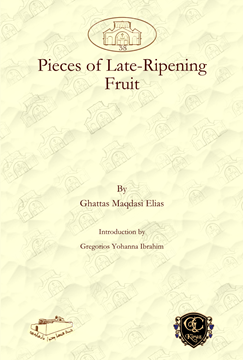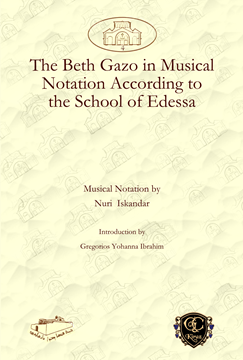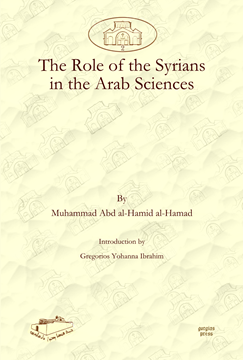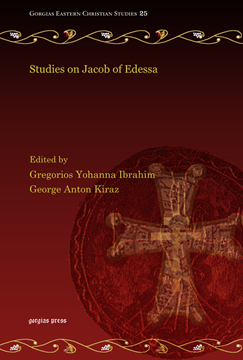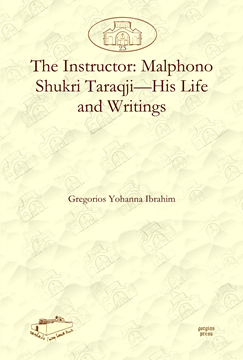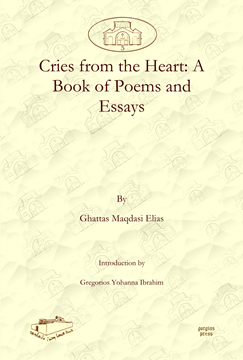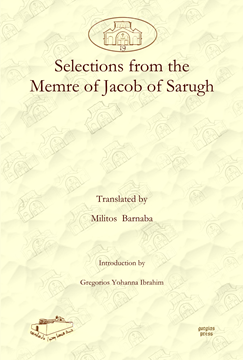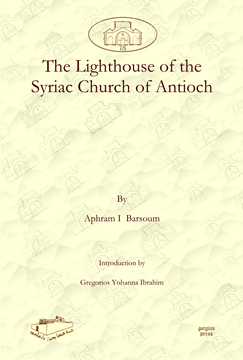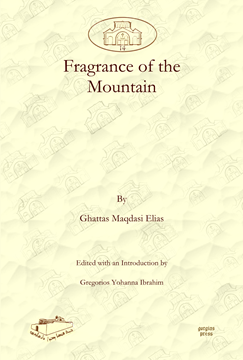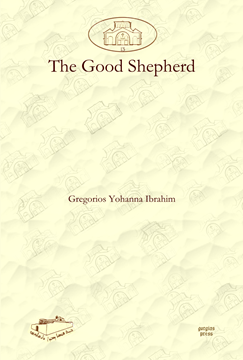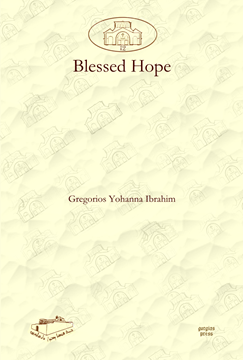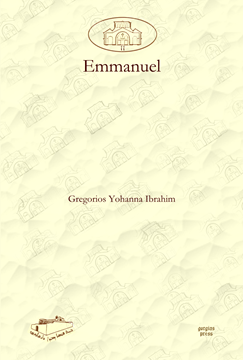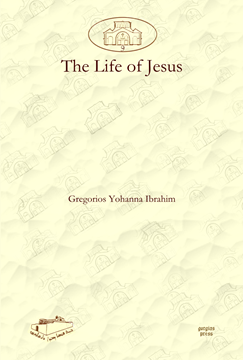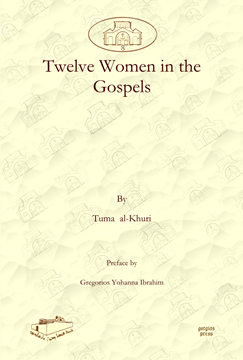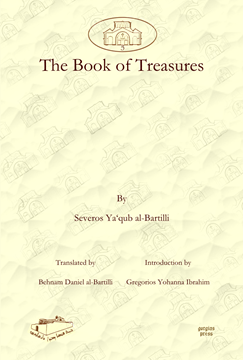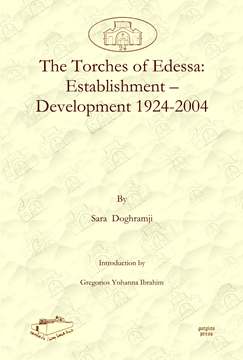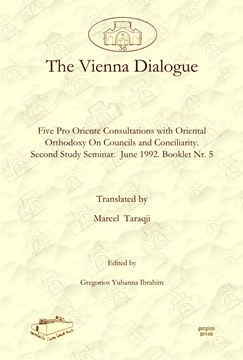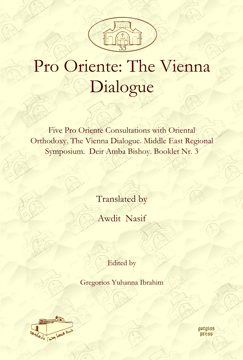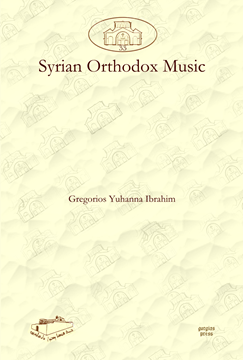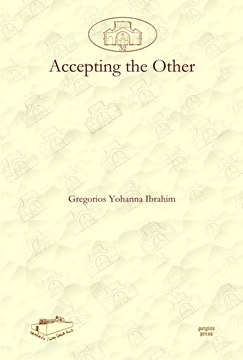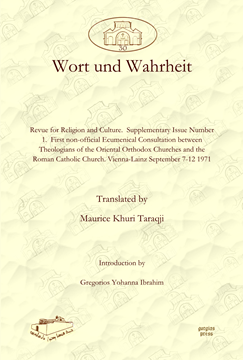Gregorios Yohanna Ibrahim
Pieces of Late-Ripening Fruit
By Ghattas Maqdasi Elias; Introduction by Gregorios Yohanna Ibrahim
ISBN: 978-1-60724-276-5
Ghattas Maqdisi Elias, “Malphono Denho,” was perhaps the greatest Syriac poet of the twentieth century and a major figure in the Syriac literary revival which took place then. This book collects together a number of Maqdisi’s writings, including poems, a series of letters written to Abrohom Nouro, selected Syriac and Arabic essays, as well as the Maqdisi’s last interview (conducted in English).
$169.00 (USD) $101.40 (USD)
The Beth Gazo in Musical Notation
According to the School of Edessa
Musical Notation by Nuri Iskandar; Introduction by Gregorios Yohanna Ibrahim
ISBN: 978-1-60724-152-2
The West Syrian Liturgy has come down to the present in three major traditions: that of Za‘faran, that of Sadad and that of Edessa. This book represents the culmination of many years of recording and effort, undertaken in both the Middle East and the US, aimed at preserving the complete Beth Gazo of Edessa in musical annotation.
$309.00 (USD) $185.40 (USD)
The Role of the Syrians in the Arab Sciences
By Muhammad Abd al-Hamid al-Hamad; Introduction by Gregorios Yohanna Ibrahim
ISBN: 978-1-60724-150-8
This book begins with a discussion of the contribution of the areas of al-Raqqa (Kallinikos) and Diyar Mudar for translations into the Arabic language; it also covers the importance of Christian monasteries in the region of the Jazira for the history of translations into Greek.
$169.00 (USD) $101.40 (USD)
Studies on Jacob of Edessa
Edited by Gregorios Yohanna Ibrahim & George Anton Kiraz
Series: Gorgias Eastern Christian Studies 25
ISBN: 978-1-60724-997-9
Jacob of Edessa was a seventh century polymath who witnessed the coming of Islam. In this collection of papers, specialists discuss the life and works of this figure with emphasis on the cultural landscape of the seventh century. Contributors include Sebastian P. Brock, Richard Price, Andreas Juckel, Alison Salvesen, Theresia Hainthaler, Amir Harrak, and Khalid Dinno.
$163.00 (USD) $97.80 (USD)
Malphono Shukri Taraqji—His Life and Writings
ISBN: 978-1-60724-248-2
Shukri Taraqji (1911-1982) was an important figure in the Syriac literary revival of the twentieth century and this small volume collects a number of his writings into one convenient place. An introduction by Bishop Gregorios Yohanna Ibrahim provides an account of Taraqji’s life and activities, both professional and ecclesiastical. This volume will be of great interest to anyone interested in the contemporary history of Syrian Orthodox Christianity, Syriac, and Middle Eastern Christianity.
$118.00 (USD) $70.80 (USD)
A Book of Poems and Essays
By Ghattas Maqdasi Elias; Introduction by Gregorios Yohanna Ibrahim
ISBN: 978-1-60724-151-5
This is a collection of poems and essays by Ghattas Maqdasi Elias, an important figure in twentieth-century Syrian Orthodox letters and education, also known as ‘Malfono Denho.’ The book contains writings previously published in books and journals as well as items published for the first time in this volume.
$148.00 (USD) $88.80 (USD)
Selections from the Memre of Jacob of Sarugh
Translated by Militos Barnaba; Introduction by Gregorios Yohanna Ibrahim
ISBN: 978-1-60724-170-6
Militos Barnaba has chosen 20 of the most beautiful memre of Jacob of Sarugh and here provided a sense-for-sense translation of them into Arabic. For each memra a short excerpt of the Syriac original is given, followed by an Arabic translation of the entire piece. An introduction by Bishop Gregorios Yohanna Ibrahim provides background on the life and writings of Jacob of Sarugh.
$169.00 (USD) $101.40 (USD)
The Lighthouse of the Syriac Church of Antioch
By Aphram I Barsoum; Introduction by Gregorios Yohanna Ibrahim
ISBN: 978-1-60724-169-0
This book is a collection of articles written by the eminent scholar and Syrian Orthodox Patriarch Ephrem Barsaum. The “Lighthouse” in the book is meant to refer to the thought of Patriarch Barsaum: like a lighthouse, every researcher, scholar, or reader of Syriac must turn towards it for guidance. The articles in this volume display Barsoum’s characteristic erudition and scholarly thoroughness and cover a wide variety of topics, all related to the history of the various Syriac-speaking churches and the churches of Antioch, in addition to other Middle Eastern Churches.
$142.00 (USD) $85.20 (USD)
The Book of Treasures
By Job of Edessa; Translated by Yusuf Habbi & Behnam Daniel ; Introduction by Gregorios Yohanna Ibrahim
ISBN: 978-1-60724-168-3
Written around 817 AD, Job of Edessa's Book of Treasures is an encyclopedia of philosophy and natural philosophy. Habbi and Daniel’s introduction to The Book of Treasures provides a thorough overview of what we know about the life and writings of Job of Edessa and also discusses the sources of The Book of Treasures. This new translation of The Book of Treasures will be an important resource for all interested in the intellectual world of the Greco-Syriac-Arabic translation movement of the Abbasid period and the history of scientific study and research in Syriac.
$197.00 (USD) $118.20 (USD)
Fragrance of the Mountain
By Ghattas Maqdasi Elias; Edited with an Introduction by Gregorios Yohanna Ibrahim
ISBN: 978-1-60724-165-2
Ghattas Maqdasi Elias, the ‘Malphono,’ was one of the most important Syriac writers of the twentieth century and devoted much of his life to ensuring that classical Syriac remained a vibrant and living language. For the lover of Syriac and Syriac poetry, therefore, this small book represents a special treat: a collection of twenty five of Elias’ poems are assembled and printed here.
$103.00 (USD) $61.80 (USD)
The Good Shepherd
ISBN: 978-1-60724-164-5
This small book is the fourth volume in the ‘Allah Ma‘na’ (God With Us) series, created by the Syrian Orthodox community of Aleppo for use in Christian schools, Sunday schools, and Church educational programs. This particular volume focuses on the theme of Christ as the Good Shepherd. Stories includie: Christ’s preaching in Nazareth, the parable of the Good Samaritan, the parable of the Lost Sheep, the Feeding of the Five Thousand, Jesus as the Gate, and Jesus as the Good Shepherd.
$110.00 (USD) $66.00 (USD)
Blessed Hope
ISBN: 978-1-60724-163-8
This small book is the second volume in the ‘Allah Ma‘na’ (God With Us) series, created by the Syrian Orthodox community of Aleppo for use in Christian schools, Sunday schools, and Church educational programs. The series aims to introduce and teach children about the life of Christ. This particular volume seeks to highlight the role of hope in the life of the Christian, taking Paul’s words in Romans 8:24 as its jumping-off point.
$110.00 (USD) $66.00 (USD)
Emmanuel
ISBN: 978-1-60724-159-1
This small book is the first volume in the ‘Allah Ma‘na’ (God With Us) series, created by the Syrian Orthodox community of Aleppo for use in Christian schools, Sunday schools, and Church educational programs. The series aims to introduce and teach children about the life of Christ. This particular text focuses on the role of the Virgin Mary in the life of Christ and is intended for use both at school with a teacher and at home with parents.
$113.00 (USD) $67.80 (USD)
Lamb of God
ISBN: 978-1-60724-158-4
This small book is part of the ‘Allah Ma‘na’ (God With Us) series, created by the Syrian Orthodox community of Aleppo for use in Christian schools, Sunday schools, and Church educational programs. This volume presents students with actual scriptural passages from a number of the most important passages in the Gospels, including: the Annunciation, the Prologue of John, the Baptism of Christ, the Temptation, the confession of Peter, the Crucifixion, and the Resurrection.
$110.00 (USD) $66.00 (USD)
The Life of Jesus
ISBN: 978-1-60724-157-7
This small book is part of the ‘Allah Ma‘na’ (God With Us) series, created by the Syrian Orthodox community of Aleppo for use in Christian schools, Sunday schools, and Church educational programs. This particular volume is intended for use by third-graders and is meant to introduce them to the basic outlines of the life of Christ—covering all the major events from the Annunciation to Pentecost—in language they can understand.
$110.00 (USD) $66.00 (USD)
Twelve Women in the Gospels
By Tuma al-Khuri; Preface by Gregorios Yohanna Ibrahim
ISBN: 978-1-60724-156-0
The Gospels mention that Jesus had twelve male disciples who aided Him in His earthly mission of proclaiming the Gospel. But were Jesus’ helpers only men? Convinced that women played an important role in assisting Jesus’ preaching and proclamation of the Kingdom of Heaven, Tuma al-Khuri has written a book, in Arabic, highlighting twelve different females who appear in the Gospel text—the Virgin Mary, Mary Magdalene, Mary the sister of Lazarus, the Samaritan woman, and the Syro-Phoenician woman, among others.
$120.00 (USD) $72.00 (USD)
The Book of Treasures
By Severos Ya'qub al-Bartilli; Translated by Behnam Daniel al-Bartilli; Introduction by Gregorios Yohanna Ibrahim
ISBN: 978-1-60724-153-9
Among the works Jacob al-Bartilli has left us is this theological treatise, entitled The Book of Treasures, which has here been translated in its entirety into Arabic. The Syriac text remains unpublished and this Arabic translation has been executed by the Deacon Behnam Daniel al- Bartilli on the basis of three different manuscripts.
$182.00 (USD) $109.20 (USD)
Establishment – Development 1924-2004
By Sara Doghramji; Introduction by Gregorios Yohanna Ibrahim
ISBN: 978-1-60724-249-9
After the expulsion of the Syrian Orthodox community from Edessa in 1924, they found refuge in Aleppo. One of the first things the community did upon its settling in Aleppo was found a school where its youth were taught the Syriac language and important melodies and prayers from the liturgy, among other things. This school was the ancestor of the Syrian Orthodox school of Aleppo which is today called by the name of Bani Taghlib, and in this book Sara Doghramji has given us a history of this institution, from its founding in 1927 to the present.
$171.00 (USD) $102.60 (USD)
The Vienna Dialogue
Five Pro Oriente Consultations with Oriental Orthodoxy On Primacy. First Study Seminar. June 1991. Booklet Nr. 4
Translated by Marcel Taraqji; Edited by Gregorios Yohanna Ibrahim
ISBN: 978-1-60724-268-0
This is a translation into Arabic of The Vienna Dialogue: Five Pro Oriente Consultations with Oriental Orthodoxy On Primacy. First Study Seminar. June 1991. Booklet nr. 4 (Vienna, 1991) and contains documents from the discussions which took place in Vienna in June 1991 relating to the question of Papal Primacy and the various Oriental Orthodox Churches.
$129.00 (USD) $77.40 (USD)
The Vienna Dialogue
Five Pro Oriente Consultations with Oriental Orthodoxy On Councils and Conciliarity. Second Study Seminar. June 1992. Booklet Nr. 5
Translated by Marcel Taraqji; Edited by Gregorios Yohanna Ibrahim
ISBN: 978-1-60724-267-3
This is a translation into Arabic of The Vienna Dialogue: Five Pro Oriente Consultations with Oriental Orthodoxy On Councils and Conciliarity. Second Study Seminar. June 1992. Booklet No. 5 (Vienna 1993) and contains documents and communications from both Roman Catholic and Oriental Orthodox perspectives on questions relating to church councils.
$120.00 (USD) $72.00 (USD)
The Vienna Dialogue
Five Pro Oriente Consultations with Oriental Orthodoxy. The Vienna Dialogue. Middle East Regional Symposium. Deir Amba Bishoy. Booklet Nr. 3
Translated by Awdit Nasif; Edited by Gregorios Yohanna Ibrahim
ISBN: 978-1-60724-266-6
This book is a translation into Arabic of The Vienna Dialogue: five Pro Oriente consultations with Oriental Orthodoxy/ Middle East Regional Symposium, Deir Amba Bishoy, October 1991 (Vienna, 1991) and contains a number of articles by Roman Catholic and Oriental Orthodox churchmen connected to the question of the relationship between these churches.
$141.00 (USD) $84.60 (USD)
the Vienna Dialogue
Five Pro Oriente Consultations with Oriental Orthodoxy. Communiqués and Joint Documents. Booklet Nr. 1
Translated by Michel Azraq; Edited by Gregorios Yohanna Ibrahim
ISBN: 978-1-60724-265-9
This book is a translation into Arabic of The Vienna dialogue: Five Pro Oriente consulations with oriental Orthodoxy: communiqés and common declarations, edited by Rudolf Kirchschläger and Alfred Stirnemann (Horn, Austria, 1991); it contains a number of documents written by both Roman Catholic and Oriental Orthodox churchmen connected to the question of the relationship between these churches.
$134.00 (USD) $80.40 (USD)
Syrian Orthodox Music
ISBN: 978-1-60724-264-2
This book originated in Bishop Yohanna Gregorios’ dissatisfaction with the lack of a study which would show where the music of the Syrian church came from, how it was accepted in the church, the basis on which it entered the church, the regional variation in chanting traditions, and the development of church music through time.
$127.00 (USD) $76.20 (USD)
Accepting the Other
ISBN: 978-1-60724-263-5
Written by the eminent Syrian Orthodox Metropolitan of Aleppo, Accepting the Other, offers an eloquent and alternative perspective to the question of religious co-existence and the so-called ‘Clash of Civilizations.’ Bishop Gregorios’ book begins with an historical overview of the presence of Christians in the Middle East and their rich cultural contributions to the region, stretching back to the days of the Roman Empire and discusses the Islamic conquests and the Crusades from the little-heard yet extremely important Middle Eastern Christian perspective; he also offers examples of Christian-Muslim co-existence and discusses the question of citizenship.
$169.00 (USD) $101.40 (USD)
Wort und Wahrheit
Revue for Religion and Culture. Supplementary Issue Number 1. First non-official Ecumenical Consultation between Theologians of the Oriental Orthodox Churches and the Roman Catholic Church. Vienna-Lainz September 7-12 1971
Translated by Maurice Khuri Taraqji; Introduction by Gregorios Yohanna Ibrahim
ISBN: 978-1-60724-261-1
This is a translation into Arabic of Wort und Wahrheit: Revue for Religion and Culture, Supplementary Issue Number 1, which contained the papers and minutes of the first non-official ecumenical consultation between Oriental Orthodox and Roman Catholic theologians, sponsored by Pro Oriente, the ecumenical foundation. This volume contains a number of papers by Oriental Orthodox and Roman Catholic theologians relating to Christology, Monophysitism and Dyophysitism, and the acceptance of the Council of Chalcedon.
$198.00 (USD) $118.80 (USD)
- 1
- 2

